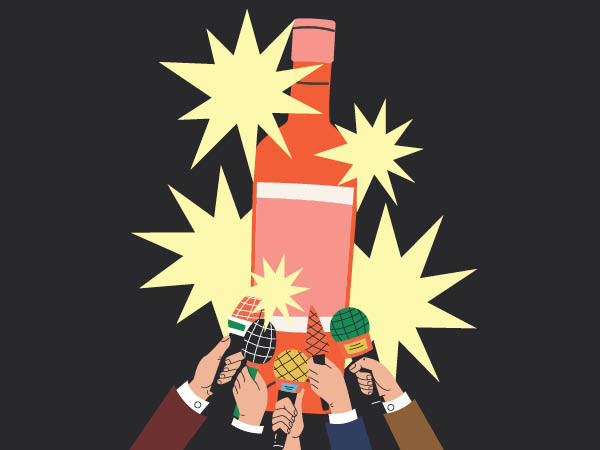
Guy Woodward: Celeb overload
I've been trying to figure out just why I’m so instinctively hostile to celebrity wines. Ultimately, I suspect it’s an inherent aversion to smug egotists enjoying gushing media coverage and immediate space on supermarket shelves despite a complete lack of winemaking credentials. I also suspect I’m not alone in this stance. But journalistic rigour demands that I essay a more objective appraisal of the worth of such wines to the industry, so in a bid to get over myself, here goes…
Of course, the actual quality of the wines is the least important element here. Few consumers buy Jon Bon Jovi’s Hampton Water rosé for its aromatic nuance or subtle saignée. They’re buying into a lifestyle. And the argument is that in so doing, they’re also buying into the category and will graduate to other wines in time. Start with Kylie’s £9.75 rosé and devotees might then move up to her £28 De Bortoli Yarra Valley Pinot Noir, before, who knows, moving on to Leroy and DRC, I guess.
A personal view is that most are as likely to revert to Blossom Hill or alcopops once they get bored – in much the same way as their favourite celeb will be putting their name to a perfume or salad dressing when the chance comes along. But veteran commentator Robert Joseph, whose opinion on such matters is shrewder than most, says this doesn’t matter. Writing in Meininger’s International, he commented: “Wine sales are falling, especially among younger potential buyers. If Drake, Kylie and Idris can do anything to slow or reverse that trend, I’ll raise a glass to them. Though possibly not one that’s full of their wine.” Quite.
- Read more: Tim Atkin MW – Rioja on the rocks?
I’m not going to pretend that I’m immune to the power of celebrity. Arguably the two most memorable jaunts of my time editing Decanter (a hotly contested title, I freely admit) were pootling around Paris with Gérard Depardieu on the back of his scooter, and sharing a bottle of 1958 Inglenook with Francis Ford Coppola over lunch at The Ledbury. I gave both their wines extensive coverage in the magazine.
The difference, I would argue, is that both saw their projects as long-term ventures, having bought wineries, employed staff and committed themselves for the long haul. Whereas for most celebrities with a wine brand, their key input is merely lending their name to the label.
↓
Product launches
Take Sarah Jessica Parker, who recently told Decanter she “wouldn’t have thought that I should be, or know enough to be, involved in wine”. But, continued the breathless article, “the award-winning actor knows a thing or two about launching quality products, from footwear and fashion to fragrances”. And sure enough, “she sensed an interesting proposition via her agent with New Zealand-based producer Invivo.” I bet she did… The resultant Invivo X, SJP cuvées are apparently about “producing quality wines while rejecting elitism… with education part and parcel to the process”, for both Parker and her fans. A noble aim, and for some commentators, enough to outweigh the transient nature of such collaborations. “People might go to see the London Philharmonic for the first time because they’re playing Michael Bublé’s greatest hits,” says Joseph. “In time, do those people graduate to listening to Mahler? Maybe, maybe not – but those musicians, even though they may have hated the event, are getting paid.”
I guess that’s it – as an industry, we hold our nose and count the cash (all the retailers I spoke to insisted that the quality of any celebrity wine they listed outweighed any star influence). But back to Bublé (who has just launched a US whiskey, natch). What if those concert-goers form the impression that Haven’t Met You Yet is representative of what classical music is all about, and in 50 years’ time the London Philharmonic is all about Bublé and there’s no Mahler? Wouldn’t such a dumbing down be rather sad?
In wine terms, such an outlook not only risks shelves becoming dominated by lookalike plonk, but depriving genuine, dedicated, skilful winemakers of exposure, revenue and even an existence. It also gives the impression, like Madonna or David Walliams writing a children’s book, that anyone can do it. And that’s my issue. Winemaking is a hugely demanding craft, full of risk, expertise, commitment and skill. It’s not just something you pick up on a whim – and it does us a disservice to pretend otherwise.




